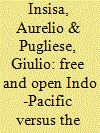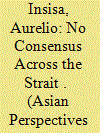|
|
|
Sort Order |
|
|
|
Items / Page
|
|
|
|
|
|
|
| Srl | Item |
| 1 |
ID:
189250


|
|
|
|
|
| Summary/Abstract |
Recent scholarship suggests that the thawing of diplomatic relations between China and Japan has caused a readjustment of Beijing’s Belt and Road Initiative and Tokyo’s Free and Open Indo-Pacific Vision towards an emerging complementarity. Through careful process-tracking, elite interviews, and analysis of Chinese and Japanese primary sources, this article instead demonstrates how, outside of the East Asian spotlight, Sino-Japanese geo-economic competition continues in South Asia and the Mekong subregion, fueled by power politics and a mutual distrust of each other’s initiatives. On the basis of this evidence, this article qualifies Sino-Japanese interactions as a quest and denial for spheres of influence, whereas the Japanese government aims at denying Chinese spheres of influence. In doing so, this article highlights how Japanese proactivism from Sri Lanka to Thailand, via infrastructure and government financing, has become a driver of growing non-traditional security cooperation with India, the U.S., and Australia.
|
|
|
|
|
|
|
|
|
|
|
|
|
|
|
|
| 2 |
ID:
185867


|
|
|
|
|
| Summary/Abstract |
Are populist governments harbingers of foreign policy disruption? The foreign policy of western Europe's first all-out populist coalition government constitutes a good window to address this question. Italy's ‘Yellow–Green’ government's decision to embrace China's Belt and Road Initiative (BRI) in 2019 has been understood as an important rupture from Italy's traditional Euro-Atlantic foreign policy. On the basis of substantial empirical research, especially elite interviews and official documentation, this article finds instead continuity with previous administrations' overtures to Beijing, including non-opposition from the EU and active engagement by the bureaucratic establishment. This article makes a contribution to the study of populism and foreign policy by positing that political marketing constitutes the key intervening variable that accounts for populist governments' rhetorical differentiation to local electorate and international counterparts alike. The Italian case demonstrates that populist ‘ruptures’ may well be about style and electioneering tactics, over substance and policy strategy. Considering the still growing number of governments that decide to sign into the BRI, most lately that of Argentina, policy-makers and observers ought to assess to what extent these are real commitments, or rather a smokescreen of marketing practices that does not change the relationship between China and the target country in any substantial manner.
|
|
|
|
|
|
|
|
|
|
|
|
|
|
|
|
| 3 |
ID:
179941


|
|
|
|
|
| Summary/Abstract |
After the 2016 elections, cross-Strait relations have fallen to their lowest point since the Third Strait Crisis. A proliferation of state-driven strategic narratives by both sides has since emerged. Against Beijing's narratives of "national rejuvenation," peaceful reunification, and "1992 Consensus," the Tsai administration has contraposed an image of Taiwan as a "beacon" of freedom and democracy in the Indo-Pacific. By tracing the tenets and the operationalization of Beijing and Taipei's strategic communications from the late 2000s to 2020, this article shows how Chinese and Taiwanese actors' reactions to the systemic pressure of a shifting East Asian regional order have progressively shaped cross-Strait communicative dynamics, severely constraining the range of options that could overcome the current impasse.
|
|
|
|
|
|
|
|
|
|
|
|
|
|
|
|
|
|
|
|
|